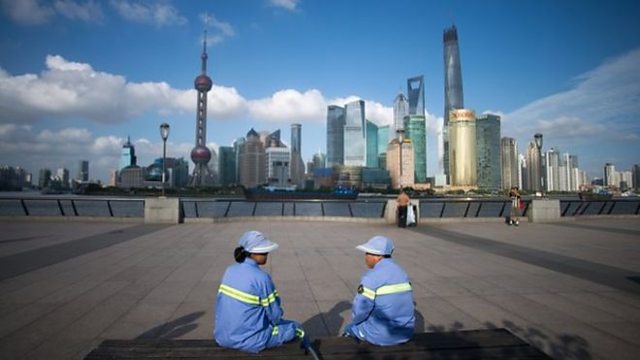China’s slowdown reverberates around the world
World Service Business Editor, Martin Webber, explains the big events of the past year.
World Service Business Editor, Martin Webber, explains the big events of the past year. Here are some excerpts:
MARTIN WEBBER:
2015 was a very bad year to be in the business of digging things out of the ground. There was a dramatic collapse in the price of many key commodities. The biggest cause was clear – a sharp downturn in China. I've been talking to two experts: Jonathan Fenby from Trusted Sources, and first Gordon Chang who wrote a book in 2001 entitled "The Coming Collapse of China".
CHANG:
Well, it's building up to a real crisis. In 2001, I said it would take a decade for economic failure. So, I'm out of time. But what we're seeing right now is a downward trajectory in the economy, growth is much less than Beijing says…but the real problem is that Chinese leaders no longer have the ability to prevent the economy from tumbling down, and the most important sign is that there's deflation - prices falling across society - and the other sign is people taking money out; in the third quarter, $460.6 billion of net capital outflow from China. That basically is I think an indication of a lack of trust and confidence in Chinese leaders.
FENBY:
I think they've still got enough ammunition to avoid a real collapse. But there will undoubtedly be a slowing down at least for the next two years…the ultimate aim of the leadership is not to open up the economy, but to make the state-controlled part of the economy stronger and more efficient. And I would say that is incompatible with the kind of initiative, the kind of liberalization that you need for a real burst of economic growth.
WEBBER:
Living standards in China have gone up hugely in the past 20 years, possibly the fastest growth of any major economy in history. Jonathan, do you think in retrospect it was just too rapid?
FENBY:
I think there's a lot of truth in that, and of course one can always say that more people have been brought out of poverty in China in the last 30 years than ever before in human history. But in a sense China has gone too far too fast and in an uncontrolled manner. And you had instances such as the downturn at the end of 2008 where the leadership basically panicked and threw enormous amounts of credit at the system. And we're still living with the hangover of the debt. As growth falls, servicing your debt gets more and more difficult.
WEBBER:
What does this actually mean for people in China because I mean the middle classes, are they really going to lose their new found wealth?
CHANG:
I think that they probably have peaked and the problem from a political point of view is a period of rising expectations where you have a sudden reversal. This has been dangerous politically as we've seen in any number of countries, especially the model that I'd look at is Indonesia under Suharto, where everybody said, this was a stable well-run authoritarian government and all of a sudden you have the Asian financial crisis in 1997 and you have Suharto out within months of that. I think you're going to probably see the same thing, because I think most people in China don't believe a one party system is appropriate for their modernising society. They may not oppose it, they may be intimidated by it, but they don't support it either. And when you see the first cracks, these types of governments tend to fail quickly.
WEBBER:
Do you think this could happen in the next decade?
CHANG:
Yeah, I think it's going to happen much sooner than that.
FENBY:
I don't think it’s going to bring it to topple. I don't think there will be the kind of complete collapse that Gordon has spoken about, because I think still there is enough conservatism, there's enough regime preservation potential there in one way or other.
WEBBER:
Gordon, if you were an advisor to the President of China, what concrete actions would you tell him to take in order to avoid this collapse that you foresee?
CHANG:
Xi Jinping won't change. So therefore the only practical thing that he can do is, get a one-way ticket to a Caribbean Island and just sort of let it out.
WEBBER:
I mean is there just no sign at all of a Gorbachev moment that the regime trying to reform itself from within?
CHANG:
Well, Xi Jinping is a stronger leader and so in a sense that if he had the right instincts, you could very well have the Chinese equivalent of glasnost and perestroika. But unfortunately his instincts are in the wrong direction and he looks back to the early years of the People's Republic, not its future.
FENBY:
You mentioned Gorbachev and that's the kind of the taboo word, the worst thing you can call a Chinese leader or a politician is, are you trying to be Gorbachev and indeed Xi Jinping shortly after he became general secretary of the Communist Party, made a speech in which he said the problem in Russia was that when the challenge came to the system there was no strong leader able to stand up for it and defend it and that's his view.
Last on
More episodes
Broadcast
- Christmas Day 2015 18:32GMT91�ȱ� World Service except Australasia, News Internet & West and Central Africa

